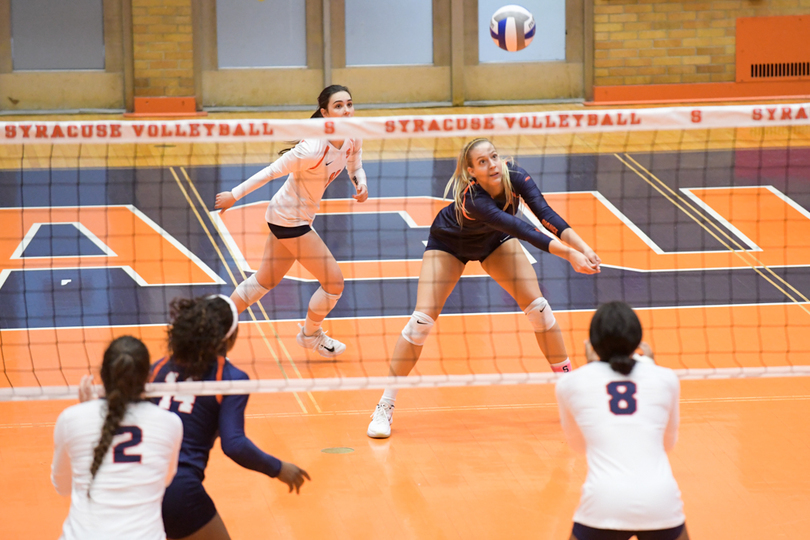Syracuse benefitting from video review, wants system expanded to all games

With the technology now frequently available, he wants to see the ACC expanding replay to every game, not just those that are televised. Max Freund | Staff Photographer
Up 20-19 in the second set against Georgia Tech on Oct. 8, Syracuse lost a point after an out call on a Santita Ebangwese kill attempt.
Or so the Orange thought. Head coach Leonid Yelin immediately went up to the second referee, challenging the call. Because the game was televised, the call was reviewed, and Ebangwese’s ball was ruled in bounds.
What would have been a tie game in a critical second set became a two-point Orange lead. SU ended up winning the set by two.
Syracuse (17-10, 9-5 Atlantic Coast) has benefited from the challenge system this season, but Yelin is not satisfied. With the technology now frequently available, he wants to see the ACC expanding replay to every game, not just those that are televised. Often, a few key points can decide a match and millimeters make the difference between winning and losing a point.
The challenge replay system was first introduced to volleyball at the Rio Olympics in 2016, after it was tested across international play in 2014 and 2015. In fall 2015, both the Big Ten and PAC-12 adopted the challenge system, and now it has expanded to other conferences.
Whenever WatchESPN or the ACC Network televises games, coaches could review any point. For Yelin, this serves as a failsafe, protecting against referee mistakes that occur due to the fast-paced nature of the sport.
“The level of the game got so much better, and unfortunately,” Yelin said, “a lot of referees are behind this game.”
When replay is available, coaches can challenge four types of calls. The most common is on in-out decisions. Coaches can also challenge a touch off a player, a service-foot fault or an illegal net touch during a point.
Coaches receive three challenges per match, and can use them as they please. Even if a coach gets the challenge right, they still sacrifice one of the challenges. Yelin prefers that the NCAA adapt to the overseas rule.
“They have two challenges every set,” Yelin said, “and if you challenge and are right you don’t lose a challenge.”
For senior Belle Sand, who played years without the challenge system, video replay has come as a huge relief for her and other players. When they are nervously standing around anticipating the call, it can kill the flow of the game. But, Sand said, getting the call right is more important than the time lost.
“I love challenges, it’s a huge momentum shift,” Sand said. “I get pumped when we win the challenges because there are some bad calls that referees make and it would be really frustrating knowing it was wrong.”
The system is not perfect because indisputable video evidence is required for the second referee to overturn the call. With only one official looking at the replay, there is no room for debate and discussion among the officials.
Also, logistically, Syracuse would need additional staff on site, along with cameras, to make the challenge system accessible for all games. This would require additional funding from the conference, Yelin said. Despite the additional costs, Yelin believes in prioritizing video review for the quality of volleyball.
“Coaches and players are putting so much time and effort and one mistake can cost the match and so many hours and days,” Yelin said. “In the end, we want the kids to win or lose because of the game, not because of a referee mistake.”




